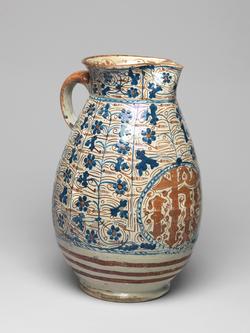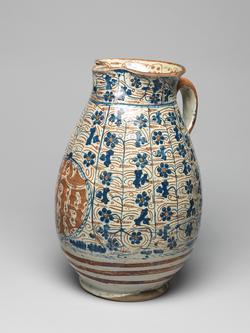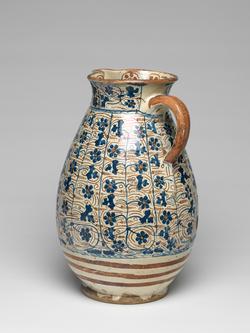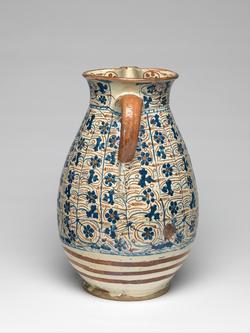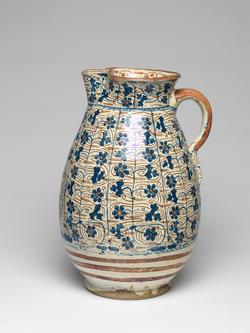Current Location: Gallery 27 (Glaisher)
Maker(s)
Pottery:
Unidentified Manises pottery
Entities
Categories
Description
Tin-glazed earthenware jug painted in blue and brownish copper-lustre with flowers and leaves, and a circular medallion containing the Sacred Monogram, 'ihs' in gothic letters
Buff earthenware, thrown, tin-glazed, and painted in cobalt-blue and brownish reduced-pigment copper-lustre. The jug has a swelling ovoid body with a short neck which is pinched at the front to form a lip. The strap handle is small and rounded, and its lower end runs down the body for a short distance. The front is decorated with a circular medallion containing the Sacred Monogram, 'ihs', in lustred gothic letters. The sides are divided into seven panels by vertical blue lines, each filled with branching stems of bryony flowers and parlsey leaves. The neck is decorated with a horizontal stem of the same motifs, and round the lower part of the body there are three horizontal lustre bands. The inside of the neck is decorated with lustred roundels and fern-like motifs
Notes
History note: Formerly on loan to the Victoria & Albert Museum; Henry Avray Tipping (1855-1933); sold Christie's, 22 February 1934, Faience, Objets d'Art . . ., the property of the late Henry Avray Tipping Esq., MA FSA, p. 5, lot 24.
Legal notes
Purchased with the Glaisher Fund
Measurements and weight
Height: 32.5 cm
Acquisition and important dates
Method of acquisition: Bought
(1934-02-22)
by
Christie's
Dating
15th Century, Mid
Renaissance
Circa
1430
CE
-
1480
CE
Note
Label text from the exhibition ‘Madonnas and Miracles: The Holy Home in Renaissance Italy’, on display at The Fitzwilliam Museum from 7 March until 4 June 2017: This jar, decorated with the IHS (a form of Christ’s name), is similar to the one in the painting by Joos van Cleve displayed nearby. Desire for the most beautiful and fashionable religious goods drove trade across Europe and beyond. Spanish maiolica was greatly valued in Italy. When displayed in the home, a jar like this therefore signalled both piety and good taste.
School or Style
Renaissance
Components of the work
Decoration
composed of
lustre
( reduced pigment lustre)
cobalt-blue
Body
Materials used in production
Tin-glaze
Earthenware
Techniques used in production
Tin-glazing
Inscription or legends present
- Text: ihs
- Location: On front
- Method of creation: Painted in gothic letters
- Type: Inscription
References and bibliographic entries
Related exhibitions
Identification numbers
Accession number: C.21-1934
Primary reference Number: 73132
Glaisher additions number: G.Add.48-1934
Stable URI
Audit data
Created: Saturday 6 August 2011
Updated: Wednesday 13 November 2024
Last processed: Tuesday 15 July 2025
Associated departments & institutions
Owner or interested party:
The Fitzwilliam Museum
Associated department:
Applied Arts
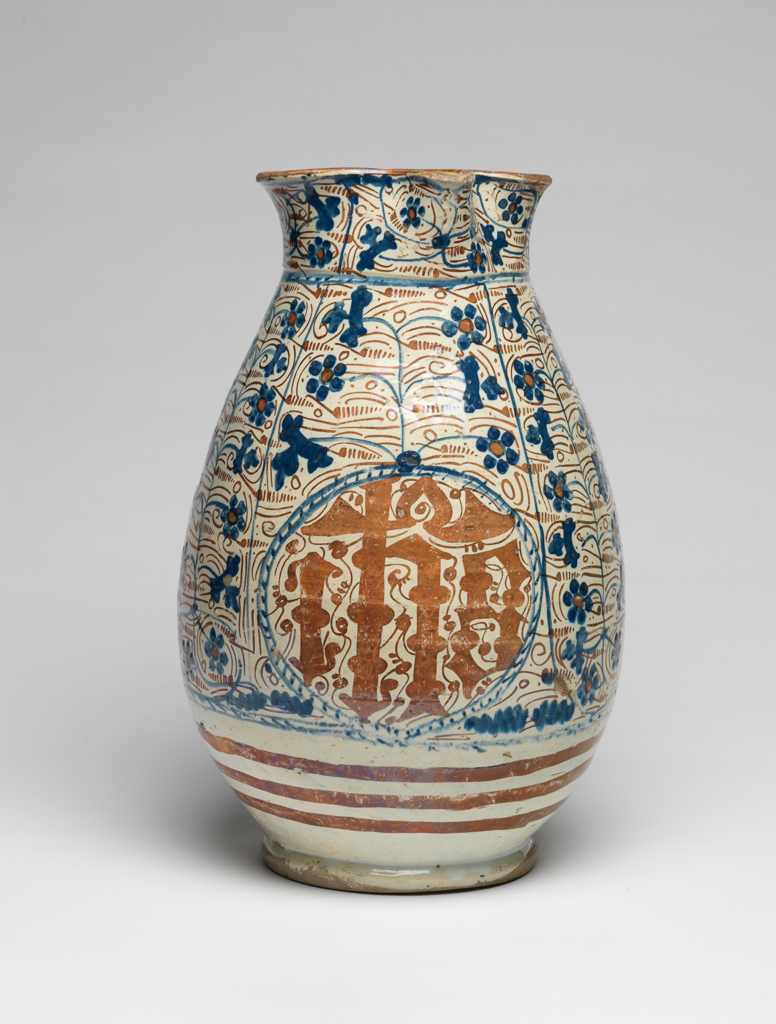
 IIIF Manifest
IIIF Manifest
